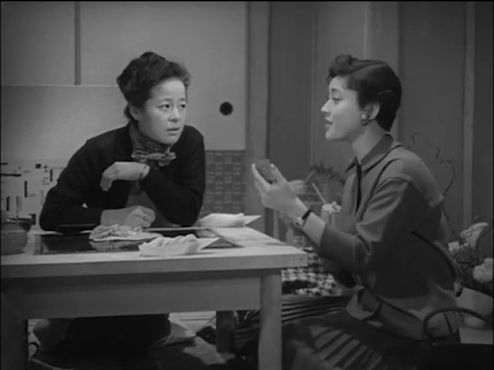Obscure Japanese Film #18
 |
| Mariko Okada |
The Seicho Matsumoto short story on which this film is loosely based appeared in English in a collection entitled The Voice and Other Stories (now out of print). The protagonist is an ambitious theatre actor whose ‘nihilistic’ face attracts the attention of a top film director, but whose big break in movies may cost him his freedom – he murdered his pregnant girlfriend some years before to evade his responsibilities and knows that a witness who saw him shortly before the crime is likely to identify him if he becomes a film star. Naturally, he decides that a second murder is the answer to his problems and, equally naturally, things fail to go as planned.
 |
| Mariko Okada and Akira Yamanouchi |
This Shochiku production bears little resemblance to the original. Here, the protagonist is Akiko (Mariko Okada), a fashion model who has an argument on a train with a backstreet abortionist (Akira Yamanouchi) she had been to for help (and possibly had a relationship with). A struggle ensues in which he falls from the train (with the help of a well-timed shove from Akiko). When he later dies in hospital, Akiko sends some flowers anonymously, a gesture which attracts the attention of a mild-mannered local detective (Ozu favourite Chishu Ryu). Not long after the incident, Akiko gets a break at work and finds she is to be promoted as a top model, but her plans are spoilt when Ishioka (Minoru Oki), a seedy character who had seen her arguing with the abortionist on the train, begins stirring things up.
 |
| Chishu Ryu |
 |
| Eitaro Ozawa |
 |
| Noriko Sengoku and Mariko Okada |
Although Eitaro Ozawa pops up as a fashion bigwig who sexually harasses Akiko and Kurosawa favourite Noriko Sengoku is memorable as her down-to-earth best friend, this is Okada’s movie all the way. As Akiko, an opportunist raised in poverty, she uses her large, wonderfully expressive eyes to considerable effect and is far more sympathetic than the one-dimensional cold-blooded murderer of Matsumoto’s original.
 |
| The surreal joys of auto-translate. |
The musical saw on the soundtrack means that the music can only be the work of the prolific Toshiro Mayuzumi, an avant-garde composer of great talent whose passion for experimentation sometimes led him to make whimsical choices when scoring films. Indeed, shortly before working on Kao he had been criticised for his eccentric use of a musical saw on Kenji Mizoguchi’s Akasen chitai (puritanically retitled Street of Shame in the West). Nevertheless, he became Shohei Imamura’s composer of choice and, when John Huston was struggling to find a composer he felt could provide what he wanted for The Bible (1966), it was to Mayuzumi that he turned, re-employing him the following year for Reflections of a Golden Eye.
Director Tatsuo Osone (1904-63) seems to have been a journeyman who worked mainly on historical dramas; here, he does a competent if mostly unremarkable job, while his camera movements suggest the influence of Hollywood. In fact, there are moments that recall Hitchcock even if the film never reaches that standard.
Kao is must-see for fans of Mariko Okada and is also likely to be appreciated by those who enjoy films based on the works of crime writer Seichi Matsumoto, of which this was the first. There would be many good ones to come, especially those directed by Yoshitaro Nomura. Matsumoto’s popularity seems never to have waned in Japan, and the original story would go on to be filmed umpteen times for television there. As far as I can tell, Kao has never been screened abroad.
The film is available on DVD (without subtitles) here.
No comments:
Post a Comment